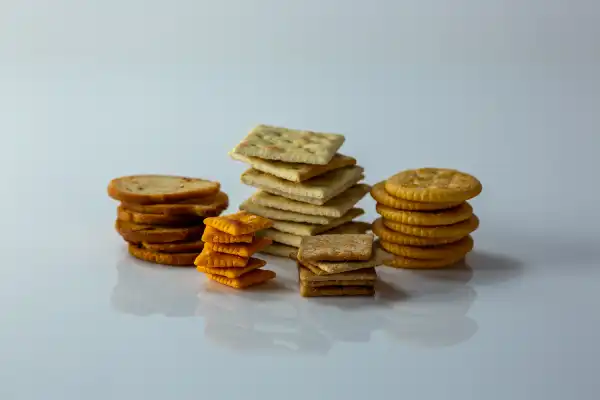Access our First Foods® Database in the Solid Starts App.
Learn moreCrackers
Grain
Age Suggestion
12 months
Iron-Rich
No
Common Allergen
Yes

Warning
Make sure to serve crackers in an age-appropriate way, as they pose an increased choking risk for babies and toddlers.
When can babies have crackers?
It depends on the type. Because crackers are common choking hazards, it is best to wait until after the first birthday to share soft crackers (styles that melt in the mouth or easily crumble when gently pressed like Goldfish crackers, Ritz crackers, Saltines, and water biscuits, among others). Hard, brittle, or sharp crackers should be reserved for when a child has more advanced eating skills, typically around 24 months of age. Note: Crackers often contain common allergens like dairy, egg, sesame, soy, tree nut, and wheat, and may contain honey, which should not be offered to babies under 12 months of age as it is associated with a risk of infant botulism.
Crackers are consumed worldwide in many forms, such as crispbread, graham crackers, kropek (prawn crackers), matzah, oat cake, and papadum. Some are leavened with baking soda, while others are unleavened. Some cracker varieties are “docked” before baking, which means they are poked with holes so that they don’t puff up too much in the heat, helping them stay flat and crispy. Crackers can be made of almond flour, puffed rice, wheat flour, and much more. Many are served with a cheese or spread, while others are offered on the side of a meal for dipping.
How do you serve crackers to babies?
Every baby develops on their own timeline, and the suggestions on how to cut or prepare particular foods are generalizations for a broad audience.
6 to 11 months old:
Opt for teething rusks and other styles of crackers or biscuits that are made for infants, and avoid crackers that are harder or sharper. Infant crackers are safer for babies because they are thin, lack sharp edges, and tend to melt in the mouth as baby eats. Make sure that they are not stale, as the consistency of stale crackers can change and become more challenging. Consider serving infant crackers with nourishing dips or spreads such as mashed avocado, hummus, or pureed beans.
You can also offer thin-style puffed rice cakes, but hold off on thick rice cakes until baby is older, as they pose a higher choking risk. Hold off on serving other styles of cracker at this age due to choking risk, and avoid crackers that contain honey due to the risk of infant botulism.
12 months old +:
Serve soft crackers that do not have sharp edges and soften on contact with saliva. These include cream crackers, oyster crackers, papadam, and water biscuits, among others. Crackers in the style of Goldfish crackers, Ritz crackers, and Saltines also work for this age. While some of these crackers can be high in sodium, offering them as part of a variety of foods in a balanced diet is not a cause for concern. Hold off on serving hard, brittle crackers and biscuits with sharp edges at this age due to the choking risk.
24 months old +:
Serve soft crackers like cream crackers, papadam, water biscuits, crackers in the style of Ritz, Saltines, and Goldfish, and others that melt in the mouth to minimize the risk of choking. Wait to offer hard crackers with sharp edges like bagel chips, tortilla chips, Triscuit crackers, Wheat Thin crackers, and others until the toddler has developed mature eating skills (including taking manageable bites, thoroughly chewing food, and safely swallowing). Make sure the child is seated in a safe eating environment, as eating while distracted, talking, running, or playing greatly increases choking risk. Many toddlers enjoy dipping, so consider serving crackers with a dip.



Videos
Are crackers a choking hazard for babies?
Yes. Crackers are a common choking hazard, and most styles are firm and sharp, which can make them more challenging to chew and more likely to scratch or poke a child’s mouth. To reduce the risk, serve age-appropriate styles of cracker to baby, make sure the crackers are not stale, and make sure the child is seated and focused while eating. As always, create a safe eating environment and stay within reach of baby during meals.
Learn the signs of choking and more about choking first aid in our free guides, Infant Rescue and Toddler Rescue.
Do crackers contain common allergens?
Yes. Crackers are commonly made with wheat and other gluten-containing grains, and may contain other common allergens such as dairy, peanut, sesame, soy, tree nuts, and others. Read ingredient labels carefully before serving.
Prior to sharing crackers with baby, it is important to introduce common food allergens and rule out an allergy before serving those allergens together in a prepared food. This way, you’ll be able to identify which allergen is responsible if baby has a reaction. Then, when you are ready to offer crackers, you will be confident that the child has already safely eaten any common food allergens in the food.
As you would when introducing any new food, start with a small amount at first and follow baby’s lead.
Are crackers safe for babies?
It depends on the type. For babies under 12 months of age, avoid crackers made with honey, which is associated with a risk of infant botulism. Many crackers also pose an increased choking risk for babies, but generally speaking, crackers like teething rusks and “baby crackers” tend to be safer for babies, since they are made to melt in the mouth on contact with saliva. Make sure that they are not stale, as the consistency of stale crackers can change and become more challenging.
When can babies eat puffed rice cakes?
Hold off on serving thicker-style puffed rice cakes until 18 months of age and the child has more mature eating skills. That said, babies can have thin-style puffed rice cakes as soon as they are developmentally ready for solids, around 6 months of age, since these soften readily on contact with saliva, which reduces choking risk. When possible, look for thin, soft multi-grain cakes that do not rely solely on rice as an ingredient in order to reduce baby’s exposure to arsenic in processed rice products. Learn more about rice and arsenic here. Note that any kind of puffed rice cake can become more challenging to eat when stale.
Our Team
Written by
Expert Tips Delivered to Your Inbox
Sign up for weekly tips, recipes and more!
Copyright © 2026 • Solid Starts Inc






